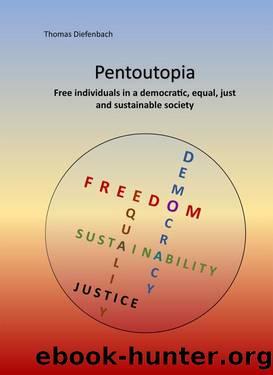Pentoutopia: Free individuals in a democratic, equal, just and sustainable society by Thomas Diefenbach

Author:Thomas Diefenbach [Diefenbach, Thomas]
Language: eng
Format: epub
Publisher: Thomas Diefenbach
Published: 2022-10-03T00:00:00+00:00
3) The workings of the democratic market economy
The behavioural and microeconomic foundations and workings of a market economy stretch from individual market participantsâ economic behaviour via interactions among and between market participants to the emergence and functioning of whole industries and markets. That the democratic market economy functions differently (and so much better) is due to its institutions, but also to legitimate market participantsâ orientations and behaviour â individual market participantsâ economic behaviour, the actions and interactions between market participants (direct cooperation, cooperative patterns and networks, competitive behaviour) â the functioning of whole industries, as well as economic growth/social, environmental and economic development as main outcomes of market participantsâ orientations and behaviour at aggregated level.
First, as argued above, it is about individual market participantsâ economic behaviour, i.e. the ways individual market participants conduct economic activities and their business, operate and behave in a market environment in accordance with their orientations, purposes, goals and objectives. Because of their (pro)social, pro-environmental and socio-economic orientations and objectives, democratic organisations predominantly act, and conduct their business, in considerate, responsible, balanced and sustainable ways.
Moreover, besides their actions it is also democratic organisationsâ interactions with other market participants that are different â and make a difference. Because of their predominantly (pro)social orientation and behaviour and their stakeholder orientation â and corresponding internal functioning that largely follows the rationales of (democratic) collaboration â democratic organisations have a cooperative mind, a strong sense of cooperation, solidarity and active citizenship. They find more common interests with others and thus act and collaborate in more mutually beneficial ways, conduct (their) business in more collaborative ways. Agricultural, housing, retail and consumer cooperatives, democratic financial institutions (cooperative banks, credit unions, savings banks, building societies) are perhaps some of the most commonly known and long-established forms of organised cooperation between free individuals and market participants. And there are, of course, other forms of organised cooperation that are equally relevant, namely partnerships, associations, community-based networks, clubs, civil society organisations, non-governmental organisations and the like.
These forms of organised cooperation are meant to help their members to pursue common goals and to conduct certain activities collectively, to aggregate, pool and share resources, to achieve economies of scale as well as higher quality in what their members do. Such cooperation leverages individual membersâ capabilities considerably, offers various advantages and creates new opportunities for them as market participants.
Increased cooperation between individual market participants leads not only to the establishment of organised cooperation (i.e. partnerships, associations, cooperatives, civil society organisations and so on) but to patterns of cooperation that go beyond single organisations or even networks of cooperation. Democratic organisations (and self-employed) often seek to establish patterns, clusters or networks of collaboration. Cooperation transforms how whole industries work. In the democratic market economy, organised cooperation will be the prevailing mode of interactive market-oriented behaviour of market participants in all markets and industries.
Market participants cooperate systematically and routinely not only for reaping the benefits of the actual cooperation but also for being or becoming more competitive, that they can compete more successfully.
Download
This site does not store any files on its server. We only index and link to content provided by other sites. Please contact the content providers to delete copyright contents if any and email us, we'll remove relevant links or contents immediately.
The remains of the day by Kazuo Ishiguro(8350)
Tools of Titans by Timothy Ferriss(7759)
Giovanni's Room by James Baldwin(6771)
The Black Swan by Nassim Nicholas Taleb(6732)
Inner Engineering: A Yogi's Guide to Joy by Sadhguru(6419)
The Way of Zen by Alan W. Watts(6264)
Asking the Right Questions: A Guide to Critical Thinking by M. Neil Browne & Stuart M. Keeley(5332)
The Power of Now: A Guide to Spiritual Enlightenment by Eckhart Tolle(5307)
The Six Wives Of Henry VIII (WOMEN IN HISTORY) by Fraser Antonia(5206)
Astrophysics for People in a Hurry by Neil DeGrasse Tyson(4982)
12 Rules for Life by Jordan B. Peterson(4151)
Housekeeping by Marilynne Robinson(4038)
The Ethical Slut by Janet W. Hardy(4019)
Skin in the Game by Nassim Nicholas Taleb(3951)
Double Down (Diary of a Wimpy Kid Book 11) by Jeff Kinney(3893)
Ikigai by Héctor García & Francesc Miralles(3847)
The Art of Happiness by The Dalai Lama(3830)
Skin in the Game: Hidden Asymmetries in Daily Life by Nassim Nicholas Taleb(3708)
Walking by Henry David Thoreau(3668)
